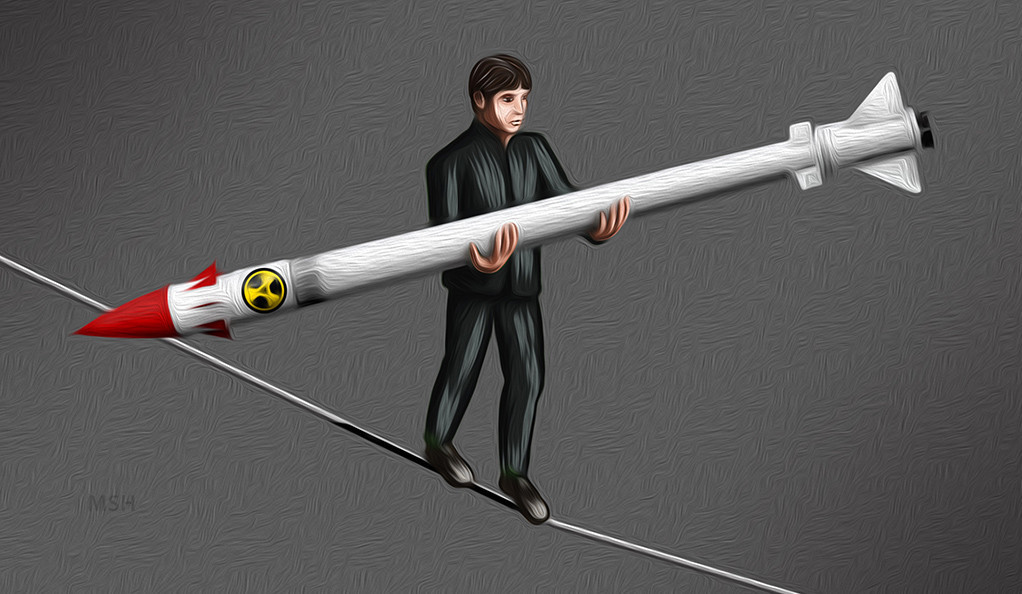Kimball Smith Series hosts panel discussion on nuclear weapons
The Kimball Smith Series, which is in its first year, hosted an event on nuclear weapons on Friday.

Yale News
On Friday, the Kimball Smith Event Series hosted an event on the physics and politics of nuclear weapons.
The program, which is in its first year, aims to address issues at the intersection of science, technology, ethics and global affairs. Friday’s event included a panel discussion featuring Alexandre Debs, a professor of political science at Yale, and Lisbeth Gronlund, a research affiliate from the MIT Laboratory for Nuclear Security and Policy, followed by small group discussions among attendees.
“I would say nuclear politics is full of contradictions,” Debs said at the panel. “Whether you look at the causes of proliferation, which states have nuclear weapons and why, or whether you look at the effect of proliferation.”
The panel was moderated by Talia Weiss GRD ’26, a doctoral student in the physics department. Weiss runs this year’s Kimball Smith Series, alongside Ellie Singer ’22 and Lucas Arthur, a graduate student at Sorbonne University in Paris.
This academic year, the Kimball Smith Series explored questions at the intersection of technology, ethics and international affairs with two programs: one on artificial intelligence and one on nuclear weapons. Weiss told the News that speakers for the two events were chosen for their complementary backgrounds and insights they bring as to how technology and physics interact with policy.
“Three decades after the Cold War, nuclear dangers continue to loom over us, and the war in Ukraine has provided a stark reminder of that fact,” Weiss told the News. “To reduce the risk of a nuclear war or accident, it is crucial to unite knowledge of physics and engineering with an understanding of foreign policy and ethics.”
Friday’s panel began with a discussion of the history of nuclear weapons and its bearing on how to manage the risk of nuclear weapons today. Nuclear weapons have lurked in the background since 1945, Debs said, pointing to flashpoints like the Cuban Missile Crisis. Both Debs and Gronlund argued that the risk of nuclear weapons has actually had a deterrent effect on countries entering into conflict, pushing countries to develop agreements to control that technology.
“When we have high tension, it may wake up leaders and activists in the international community for action,” Gronlund said.
Gronlund described a difference between the “horizontal” and “vertical” proliferation of nuclear weapons. Many countries are trying to obtain nuclear weapons, Gronlund said, but nuclear weapons are still largely concentrated in the U.S. and Russia.
Debs described nuclear weapons as “weapons of the weak,” suggesting that they serve as a protective mechanism for smaller countries against countries with otherwise much stronger military power.
“Nuclear weapons are the weapons of the weak, but very few weak states have [them],” Debs said. “It’s the weak states that would otherwise be vulnerable to much stronger states that have a lot to gain in acquiring these weapons.”
The panelists also discussed the nuclear dimension of the war in Ukraine. Nuclear weapons, Debs said, have had a large impact on international relations, even if they have not been used on the battlefield for more than 75 years. Because they are the “ultimate tools of deterrence,” states may go to great lengths to prevent adversaries and weak neighbors from acquiring them or falling under the nuclear umbrella of another state — Russia’s fear of Ukraine joining the North American Treaty Organization played a major role in the cause of the current war, Debs said.
Despite Putin’s nuclear threats and warnings to the US and NATO against intervening in the conflict, Debs told the News that the risk of nuclear escalation is low. Biden’s decision not to impose a no-fly zone has avoided a direct confrontation with Russia at the moment, he added.
Nevertheless, Debs told the News, the threat of nuclear escalation is still the “area of greatest concern today.”
“The biggest immediate concern is whether the current war in Ukraine can escalate to the nuclear level,” Debs told the News. “If [Putin] attacks convoys entering Western Ukraine, how do we know that the conflict with NATO doesn’t escalate further?”
The Kimball Smith Series honors Alice Kimball Smith, GRD ’36, a historian of the post-WWII scientists’ movement.







